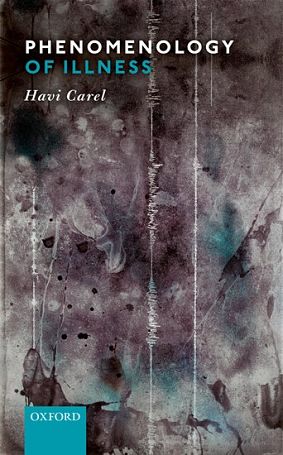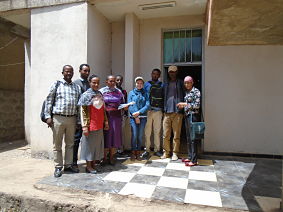Dr Catrin Campbell-Moore
'I work on the question: what does it take to be rational? I am especially interested in some difficult test cases, in particular cases where what one believes affects what happens. For example, suppose you'll be able to jump over this river only if you believe you'll be able to. Should you believe you'll make it? And what if you'll manage to make a free-throw only if you believe you'll not be able to? Should you believe you'll manage it? These questions are closely related to logical paradoxes such as the liar paradox, so an analysis of logic and the effect of logic on rationality is essential for providing the answer. This work was recently published in two leading philosophy journals.'
Professor Havi Carel
Professor Carel's work investigates the experience of illness, and in particular of respiratory illness. She is Principal Investigator on the Wellcome Trust-funded Senior Investigator Award project, the Life of Breath. Her most recent monograph, published by Oxford University Press in 2016, is Phenomenology of Illness. She was selected by students for a Best of Bristol lecture in 2016.
Dr Mhairi Gibson
Understanding 'harmful cultural practices': female genital cutting in Africa
Female genital cutting (FGC) has major implications for women's physical, sexual and psychological health, and eliminating the practice is a key (and urgent) target for global development policy-makers. This team's collaborative UK/Africa research seeks to explore how and why FGC persists despite long-standing eradication programmes. One of the barriers to meeting development goals has been identifying the intentions and behaviours underpinning the practice within communities where FGC is prevalent (the focus here being on Ethiopia and West Africa). The research combines a) innovative social science methodologies to identify the extent to which people publicly hide their views on FGC and b) theories from evolutionary biology to identify how cultural and evolutionary forces may drive FGC behaviour within communities. This work is relevant for the design and evaluation of more effective for anti-FGC interventions, and the elimination of other practices which have harmful health consequences for women.
Dr Gibson's team also include Janet Howard (Archaeology and Anthropology postgraduate research student, University of Bristol); Dr Eshetu Gurmu (Addis Ababa University) and Dr Isabel Scott (Brunel University London).
Dr Ruth Glynn
Dr Glynn's recent research has focused on cultural representations of Italy’s experience of political violence and terrorism in the 1970s, with particular reference to the psychological trauma associated with women’s participation in militant groups. Her monograph, Women, Terrorism and Trauma (2013), pioneers the application of a trauma studies approach to the cultural production addressing the anni di piombo and to women’s participation in political violence. Associated publications include co-edited volumes on cinematic representations of Italian terrorism and on the cultural legacy of the 1978 kidnapping and murder of statesman Aldo Moro.
Dr Tamar Hodos
Dr Hodos is a world-leading specialist in the archaeology of the Mediterranean's Iron Age (c.1200-c.600 BCE). As an expert in the application of globalisation theory to the past, she has recently published The Routledge Handbook of Archaeology and Globalization. She currently has a multi-strand project with the British Museum to explore the origin and manufacture of ancient organic luxury objects (funded by the Gerda Henkel Foundation and the Arts and Humanities Research Council via its CDP programme). She has received several University teaching awards, including, most recently, the 2015 Students’ Award for Outstanding Teaching for the School of Arts.
Dr Dot Price
Dr Price specialises in research that focuses on art made by women, primarily across the 20th and 21st centuries in Europe and North America. Her forthcoming monograph Icons of Modernity: women and photography in Weimar Germany (Reaktion 2019) celebrates the diverse ways in which women engaged with the new technologies of photography in Germany in the 1920s and 1930s. She is currently also writing an essay on the new woman in Weimar Germany for the Schirn Kunsthalle's forthcoming exhibition Splendour and Misery in the Weimar Republic (opening in Frankfurt in October 2017) and will deliver a public lecture at the Museum of Modern Art in Oxford next week on the art of Lubaina Himid.
Professor Sarah Street
Professor Street has led three major externally funded projects on the history of colour films: The Negotiation of Innovation: Colour Films in Britain, 1900-55 (AHRC, 2007-10); Colour in the 1920s: Cinema and its Intermedial Contexts (Leverhulme Trust, 2012-15) and The Eastmancolor Revolution and British Cinema, 1955-85 (AHRC, 2016-19). She has published extensively on many aspects of cinema history including costume, set design, gender, colour and finance. Her book, Colour Films in Britain: The Negotiation of Innovation (2012) won First Prize for Best Monograph, awarded by the British Association of Film, Television and Screen Studies.


